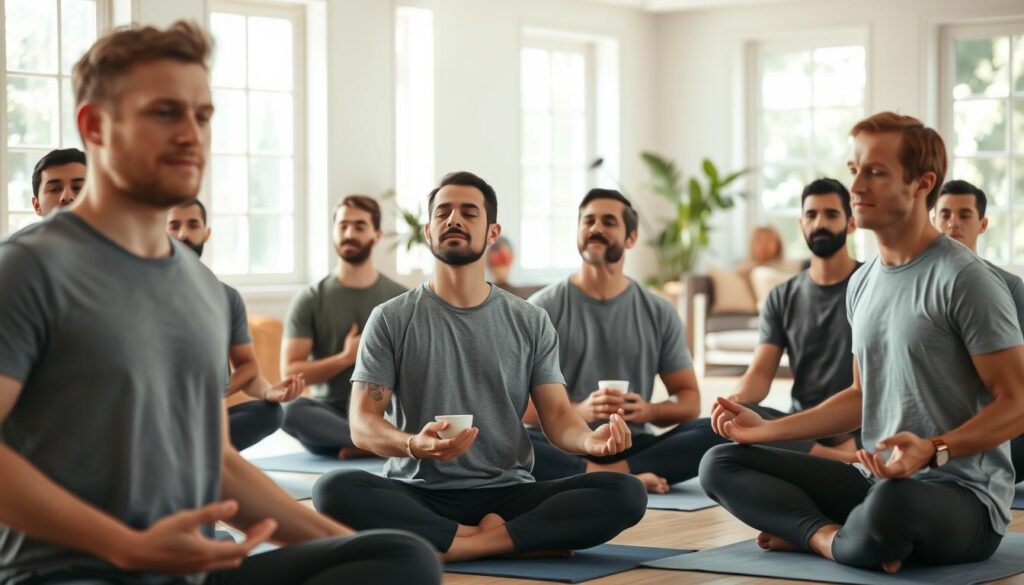Have you ever felt like you’re at your peak during a workout? Your mind and muscles are working together perfectly. It’s not just about physical strength; it’s about mental resilience too, men’s mental health.
Exercising does more than build muscle. It also boosts your mental well-being. Adding men’s mental health exercises to your routine can improve your fitness and help you face life’s challenges.
As you focus on the mind-muscle connection, you’ll see better workouts and mental health. This approach to fitness is essential for a balanced and healthy lifestyle.
Understanding men’s mental-health
As society puts more pressure on men, it’s vital to focus on their mental-health. Men’s mental-health is shaped by many things. These include what society expects, their personal experiences, and their biology.
The Importance of Mental-Health for Men
Mental health is as important as physical health for men. It impacts their life quality, relationships, and overall happiness. Ignoring mental-health can lead to serious problems like depression, anxiety, and even suicide. So, it’s key to make mental-health a priority and use effective strategies for men’s mental-health.
Here are some reasons why mental-health matters for men:
- Improved resilience to stress
- Better relationships with family and friends
- Enhanced overall well-being
- Increased productivity at work
Common Mental Health Issues Faced by Men
Men often face unique mental-health challenges. These include the pressure to meet traditional masculine norms. Common issues include:
- Depression
- Anxiety disorders
- Substance abuse
- Trauma and stress-related disorders
These problems can be caused or made worse by work stress, relationship issues, and societal expectations.
Breaking the Stigma Surrounding Mental-Health
One big barrier to men getting mental health help is the stigma around mental illness. Breaking this stigma is key to getting men to seek help when they need it. We can do this by talking openly, educating, and creating a supportive mental health culture.
Here are ways to break the stigma:
- Encourage open talks about mental health
- Educate men about mental health issues and resources
- Show positive examples of men talking about their mental health
By understanding the importance of men’s mental health, recognizing common issues, and working to reduce stigma, we can greatly improve men’s mental well-being.
The Connection Between Physical and Mental Health
There’s a strong link between exercise and mental health, backed by lots of research. Exercise can make you feel better by lowering stress and anxiety. It also boosts your mood and helps your brain work better.
How Exercise Benefits Mental Well-Being
Regular exercise is good for your mind. It can help with depression and anxiety, improve sleep, and make you feel more confident. It also makes your body release happy hormones, which is great for your mental health.
- Reduces Stress and Anxiety: Exercise helps by releasing tension and making you relax.
- Improves Mood: It makes you feel better by releasing happy hormones.
- Enhances Cognitive Function: It improves your focus and memory.
The Science Behind Mind-Body Exercises
Mind-body exercises like yoga and tai chi mix physical movement with deep breathing and meditation. They aim to balance your body and mind, leading to well-being.
These exercises work by reducing stress, improving flexibility, and clearing your mind. They help you focus on your breath and movement, leading to a calm and refreshed state.
- Yoga combines physical postures, breathing, and meditation for mental and physical health.
- Tai chi is a slow exercise that improves balance, flexibility, and mental clarity.
Adding exercises that boost mental well-being to your daily routine can greatly improve your mental health. Whether it’s cardio, strength training, or mind-body exercises, choose what you enjoy and fits your life.
Effective Mental Health Exercises for Men
Effective mental health exercises are key for men wanting to feel better. Adding these activities to your daily routine can make a big difference. You’ll notice improvements in your mental clarity and calmness.
Mindfulness Techniques for Everyday Life
Mindfulness means being fully present and engaged in the moment. It can be learned through meditation and deep breathing. By making mindfulness a part of your day, you can lower stress and boost your mental health.
Try this simple mindfulness exercise: notice your senses while doing everyday tasks. For instance, when you eat, focus on the taste, texture, and smell. This helps you stay present and grounded.
Breathing Exercises to Calm the Mind
Breathing exercises are great for calming your mind and reducing anxiety. They help you control your nervous system and relax.
Here’s a simple breathing exercise: breathe in deeply through your nose, hold it for a few seconds, then exhale slowly through your mouth. Doing this a few times can calm your mind and reduce stress.
Journaling for Emotional Clarity
Journaling is a helpful way for men to process their emotions and understand their thoughts and feelings. It lets you reflect on your experiences and grow positively.
To start journaling, take a few minutes each day to write about your experiences, thoughts, and feelings. Looking back at your journal entries can give you insights into your personal growth.
Group Activities for Mental Fitness
Group activities mix social fun with mental challenges, boosting your mood. They help you feel part of a community, which is key for mental health.
Team Sports and Their Mental Health Benefits
Team sports are great for your mind and body. They help you work better with others, feel closer to teammates, and lift your mood with happy chemicals.

- Reduced stress and anxiety
- Improved mood and overall sense of well-being
- Enhanced cognitive function through strategic thinking and problem-solving
| Team Sport | Mental Health Benefit | Physical Health Benefit |
|---|---|---|
| Soccer | Improved teamwork and communication skills | Enhanced cardiovascular health |
| Basketball | Boosted self-esteem through competition | Increased agility and coordination |
| Rugby | Developed resilience and perseverance | Improved strength and endurance |
Support Groups and Peer Interaction
Support groups are safe places for men to share and connect. This interaction is great for mental health, offering a feeling of belonging.
Some benefits of support groups include:
- Emotional support and empathy from peers
- Opportunities to share experiences and advice
- A sense of community and reduced feelings of loneliness
By joining group activities, you can actively improve your mental health. Whether it’s through sports or support groups, find what connects you and offers support.
Individual Exercises for Mental Clarity
Simple exercises can boost your mental clarity. Adding these to your daily routine can greatly improve your mental health.
Meditation and Its Benefits
Meditation is a great way to clear your mind. Spend a few minutes each day meditating to focus on the now. Regular meditation lowers stress and boosts brain function.
- Start with short sessions: Begin with 5-10 minute meditation sessions and gradually increase the duration.
- Focus on your breath: Pay attention to your breathing, noticing the sensation of the air entering and leaving your nostrils.
- Be consistent: Make meditation a daily habit, ideally at the same time each day.
Nature Walks: Connecting with the Outdoors
Nature walks also enhance mental clarity. Being outdoors calms the mind and eases anxiety and depression. Take a walk in a nearby park or forest and observe the surroundings.
- Schedule a walk: Set aside time each day for a nature walk, even if it’s just around your neighborhood.
- Leave your phone behind: Try to avoid distractions by leaving your phone behind or putting it on silent mode.
- Notice your surroundings: Pay attention to the environment, noticing the colors, textures, and smells.
By adding these exercises to your daily life, you can significantly improve your mental clarity and health.
Building a Balanced Routine
Creating a mental fitness plan tailored to you is crucial for better mental health. Being consistent is key to keeping your mind healthy. A well-planned routine can make a big difference.
The Role of Consistency
Consistency is vital for men’s mental health workouts. Regularly doing mental health exercises can improve your mental clarity and stability. It’s important to add activities that boost your mental well-being to your daily routine.
A study found that regular mindfulness practice can lower stress and anxiety.
“The key to maintaining good mental health is through consistent practice and patience,” says a mental health expert.
Creating a Personal Mental Fitness Plan
To make a personal mental fitness plan, start by setting realistic goals. Find activities you like that help your mental health, like meditation, journaling, or walks in nature.
- Assess your current mental health status.
- Set specific, achievable goals.
- Choose activities that promote mental fitness.
- Schedule these activities into your daily routine.
Here’s an example of how you can structure your mental fitness plan:
| Day | Activity | Duration |
|---|---|---|
| Monday | Meditation | 15 minutes |
| Tuesday | Journaling | 10 minutes |
| Wednesday | Nature Walk | 30 minutes |
For more men’s mental health resources, check out apps and online platforms with guided mental health exercises.

Nutrition’s Impact on Mental Health
The food you eat greatly affects your mental health. It can change your mood, how well you think, and your overall happiness. Eating foods full of important nutrients helps your mental health. But, not eating enough of these can hurt your mental state.
Foods That Boost Mood and Cognitive Function
Some foods can make you feel better mentally. Foods with omega-3s, like salmon and walnuts, are good for your brain. Whole grains, which have complex carbs, can make you feel happier by raising serotonin levels. Spinach, full of folate, can also help lower depression.
- Fatty Fish: Rich in omega-3s, which support brain function.
- Nuts and Seeds: Provide healthy fats and antioxidants.
- Leafy Greens: High in folate, which can help reduce depression.
- Whole Grains: Complex carbohydrates can boost serotonin levels.
Making dietary changes is key for men’s mental health exercises and strategies for men’s mental health. Eating foods rich in nutrients can greatly help your mental health.
The Importance of Hydration
Drinking enough water is also vital for your mental health. Even a little dehydration can make you tired, hard to focus, and irritable. Drinking water all day is key for keeping your mind sharp and your mood good.
“Dehydration can lead to decreased productivity, headaches, and difficulty concentrating, all of which can negatively impact mental health.”
To stay hydrated, drink at least eight glasses of water a day. Eating foods like cucumbers, celery, and watermelon also helps. Check your urine color and how often you go to see if you’re drinking enough. It should be pale yellow and you should go often enough.
Resources for Mental Health Support
Looking for help is a sign of strength. There are many resources for men’s mental health. You don’t have to face life’s challenges alone. There are different kinds of support to help you stay mentally well.
Professional Help: When to Seek Therapy
If you’re feeling anxious, depressed, or struggling with mental health issues, getting professional help is key. Therapy offers a safe space to talk about your feelings and learn how to cope. It’s important to know when you need help. Signs include feeling sad all the time, changes in appetite or sleep, or trouble focusing.
There are many types of therapy. Cognitive-behavioral therapy (CBT) helps change negative thoughts. Psychodynamic therapy looks into why you feel and behave certain ways.
Apps and Tools for Managing Mental Health
There are also apps and tools to help with mental health. These can track your mood, help with mindfulness, and keep you connected with others.
- Mood tracking apps like Daylio can help you monitor your emotions and identify patterns.
- Meditation apps such as Headspace and Calm offer guided sessions to reduce stress and improve focus.
- Support groups, either online or in-person, provide a community where you can share experiences and receive support.
| Resource Type | Description | Examples |
|---|---|---|
| Therapy | Professional counseling to address mental health issues | CBT, Psychodynamic Therapy |
| Mood Tracking Apps | Apps to monitor and manage your mood | Daylio, Moodfit |
| Meditation Apps | Guided meditation sessions for relaxation and focus | Headspace, Calm |
By using these resources, you can take steps to improve your mental health. Remember, asking for help is a sign of strength. There are many tools to support you on your journey.
The Role of Hobbies in Mental Well-Being
Spending time on hobbies can greatly boost your mental health. Doing things you love helps distract you from daily stress. It also makes you feel accomplished and happy.
Creative Outlets: Art, Music, and More
Activities like painting, playing music, or writing are great for your mind. They let you share your feelings and thoughts in a good way. This helps you deal with stress and anxiety.
- Art Therapy: Art helps you understand your emotions and see things differently.
- Music Therapy: Playing music or singing can make you feel less stressed and happier.
- Writing: Writing down your thoughts or stories can help you express and clear your mind.
The Therapeutic Effects of Gardening
Gardening is also good for your mental health. It’s a workout that can lower anxiety and depression. Taking care of plants also gives you a sense of purpose and happiness.
- Gardening can calm you down and make you feel peaceful.
- It’s a workout that improves your physical health, which helps your mental health too.
- Looking after plants boosts your sense of responsibility and self-worth.
Adding hobbies to your daily life can really help your mental health. Whether it’s through creative activities or gardening, enjoying your time can make a big difference in how you feel.
Staying Motivated: Long-Term Mental Fitness
To keep your mind fit for the long haul, staying motivated is key. It’s about sticking to your goals and using the right strategies to stay on track.
Setting realistic goals is a great way to stay motivated. Break big goals into smaller tasks. This makes progress feel achievable and helps you stay focused.
Don’t forget to celebrate the small wins. Acknowledging your achievements, no matter how small, boosts your mood and encourages good habits.
Strategies for Long-Term Motivation
- Set clear, achievable goals
- Create a routine and stick to it
- Track your progress
- Celebrate small wins
- Stay accountable with a support system
Being consistent is crucial for mental fitness. A routine makes mental fitness practices a habit. Here’s a simple routine to get you started:
| Day | Mental Fitness Activity | Duration |
|---|---|---|
| Monday | Meditation | 20 minutes |
| Tuesday | Journaling | 15 minutes |
| Wednesday | Yoga | 30 minutes |
As you move forward, be ready to adjust your approach. Staying motivated is a journey that takes time and effort.
By making these strategies part of your daily life, you’ll be on your way to lasting mental fitness and reaching your goals.
Conclusion: Embracing a Holistic Approach
Getting better mental health is not just about one thing. It’s about combining physical exercise, good nutrition, and managing stress. Understanding how these parts work together helps you create a strong mental fitness plan. This plan boosts your overall health and happiness.
Mental Health Journey
Starting your mental health journey is easy. Just take small, steady steps. Add mindfulness, exercise, and healthy eating to your daily life. Also, don’t forget to seek help from mental health experts or support groups.
Starting Your Mental Fitness Journey
Begin your path to better mental health by looking into men’s mental health resources. Use online tools, apps, and local services that help with mental health. Everyone’s journey is different, and the right resources can really help you.
By using a holistic approach and finding the right help, you can build a stronger mental state. Start your mental fitness journey now. Discover how a balanced and healthy lifestyle can change your life.



One Response